|
|
|
Sort Order |
|
|
|
Items / Page
|
|
|
|
|
|
|
| Srl | Item |
| 1 |
ID:
113561
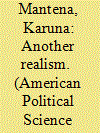

|
|
|
|
|
| Publication |
2012.
|
| Summary/Abstract |
Although Gandhi is often taken to be an exemplary moral idealist in politics, this article seeks to demonstrate that Gandhian nonviolence is premised on a form of political realism, specifically a contextual, consequentialist, and moral-psychological analysis of a political world understood to be marked by inherent tendencies toward conflict, domination, and violence. By treating nonviolence as the essential analog and correlative response to a realist theory of politics, one can better register the novelty of satyagraha (nonviolent action) as a practical orientation in politics as opposed to a moral proposition, ethical stance, or standard of judgment. The singularity of satyagraha lays in its self-limiting character as a form of political action that seeks to constrain the negative consequences of politics while working toward progressive social and political reform. Gandhian nonviolence thereby points toward a transformational realism that need not begin and end in conservatism, moral equivocation, or pure instrumentalism.
|
|
|
|
|
|
|
|
|
|
|
|
|
|
|
|
| 2 |
ID:
113553
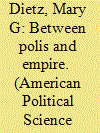

|
|
|
|
|
| Publication |
2012.
|
| Summary/Abstract |
Aristotle lived during a period of unprecedented imperial expansionism initiated by the kings of Macedon, but most contemporary political theorists confine his political theorizing to the classical Greek city-state. For many, Aristotle's thought exhibits a parochial Hellenocentric "binary logic" that privileges Greeks over non-Greeks and betrays a xenophobic suspicion of aliens and foreigners. In response to these standard "polis-centric" views, I conjure a different perceptual field-"between polis and empire"-within which to interpret Aristotle's Politics. Both theorist and text appear deeply attentive to making present immediate things "coming to be and passing away" in the Hellenic world. Moreover, "between polis and empire," we can see the Politics actually disturbing various hegemonic Greek binary oppositions (Greek/barbarian; citizen/alien; center/periphery), not reinforcing them. Understanding the Politics within the context of the transience of the polis invites a new way of reading Aristotle while at the same time providing new possibilities for theorizing problems of postnational citizenship, transnational politics, and empire.
|
|
|
|
|
|
|
|
|
|
|
|
|
|
|
|
| 3 |
ID:
113554
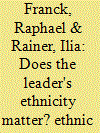

|
|
|
|
|
| Publication |
2012.
|
| Summary/Abstract |
In this article we reassess the role of ethnic favoritism in sub-Saharan Africa. Using data from 18 African countries, we study how the primary education and infant mortality of ethnic groups were affected by changes in the ethnicity of the countries' leaders during the last 50 years. Our results indicate that the effects of ethnic favoritism are large and widespread, thus providing support for ethnicity-based explanations of Africa's underdevelopment. We also conduct a cross-country analysis of ethnic favoritism in Africa. We find that ethnic favoritism is less prevalent in countries with one dominant religion. In addition, our evidence suggests that stronger fiscal capacity may have enabled African leaders to provide more ethnic favors in education but not in infant mortality. Finally, political factors, linguistic differences, and patterns of ethnic segregation are found to be poor predictors of ethnic favoritism.
|
|
|
|
|
|
|
|
|
|
|
|
|
|
|
|
| 4 |
ID:
113551
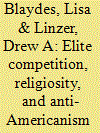

|
|
|
|
|
| Publication |
2012.
|
| Summary/Abstract |
The battle for public opinion in the Islamic world is an ongoing priority for U.S. diplomacy. The current debate over why many Muslims hold anti-American views revolves around whether they dislike fundamental aspects of American culture and government, or what Americans do in international affairs. We argue, instead, that Muslim anti-Americanism is predominantly a domestic, elite-led phenomenon that intensifies when there is greater competition between Islamist and secular-nationalist political factions within a country. Although more observant Muslims tend to be more anti-American, paradoxically the most anti-American countries are those in which Muslim populations are less religious overall, and thus more divided on the religious-secular issue dimension. We provide case study evidence consistent with this explanation, as well as a multilevel statistical analysis of public opinion data from nearly 13,000 Muslim respondents in 21 countries.
|
|
|
|
|
|
|
|
|
|
|
|
|
|
|
|
| 5 |
ID:
113556


|
|
|
|
|
| Publication |
2012.
|
| Summary/Abstract |
Do voters reward presidents for increased federal spending in their local constituencies? Previous research on the electoral consequences of federal spending has focused almost exclusively on Congress, mostly with null results. However, in a county- and individual-level study of presidential elections from 1988 to 2008, we present evidence that voters reward incumbent presidents (or their party's nominee) for increased federal spending in their communities. This relationship is stronger in battleground states. Furthermore, we show that federal grants are an electoral currency whose value depends on both the clarity of partisan responsibility for its provision and the characteristics of the recipients. Presidents enjoy increased support from spending in counties represented by co-partisan members of Congress. At the individual level, we also find that ideology conditions the response of constituents to spending; liberal and moderate voters reward presidents for federal spending at higher levels than conservatives. Our results suggest that, although voters may claim to favor deficit reduction, presidents who deliver such benefits are rewarded at the ballot box.
|
|
|
|
|
|
|
|
|
|
|
|
|
|
|
|
| 6 |
ID:
113558


|
|
|
|
|
| Publication |
2012.
|
| Summary/Abstract |
Popular support for the welfare state varies greatly across nations and policy domains. We argue that these variations-vital to understanding the politics of the welfare state-reflect in part the degree to which economic disadvantage (low income) and economic insecurity (high risk) are correlated. When the disadvantaged and insecure are mostly one and the same, the base of popular support for the welfare state is narrow. When the disadvantaged and insecure represent two distinct groups, popular support is broader and opinion less polarized. We test these predictions both across nations within a single policy area (unemployment insurance) and across policy domains within a single polity (the United States, using a new survey). Results are consistent with our predictions and are robust to myriad controls and specifications. When disadvantage and insecurity are more correlated, the welfare state is more contested.
|
|
|
|
|
|
|
|
|
|
|
|
|
|
|
|
| 7 |
ID:
113559


|
|
|
|
|
| Publication |
2012.
|
| Summary/Abstract |
We present a legislative bargaining model of the provision of a durable public good over an infinite horizon. In each period, there is a societal endowment that can either be invested in the public good or consumed. We characterize the optimal public policy, defined by the time path of investment and consumption. In a legislature representatives of each of n districts bargain over the current period's endowment for investment in the public good and transfers to each district. We analyze the Markov perfect equilibrium under different voting q-rules where q is the number of yes votes required for passage. We show that the efficiency of the public policy is increasing in q because higher q leads to higher investment in the public good and less pork. We examine the theoretical equilibrium predictions by conducting a laboratory experiment with five-person committees that compares three alternative voting rules: unanimity (q = 5), majority (q = 3), and dictatorship (q = 1).
|
|
|
|
|
|
|
|
|
|
|
|
|
|
|
|
| 8 |
ID:
113557
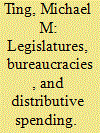

|
|
|
|
|
| Publication |
2012.
|
| Summary/Abstract |
This article develops a theory of bureaucratic influence on distributive politics. Although there exists a rich literature on the effects of institutions such as presidents, electoral systems, and bicameralism on government spending, the role of professional bureaucrats has yet to receive formal scrutiny. In the model, legislators bargain over the allocation of distributive benefits across districts. The legislature may either "politicize" a program by bargaining directly over pork and bypassing bureaucratic scrutiny, or "professionalize" it by letting a bureaucrat approve or reject project funding in each district according to an underlying quality standard. The model predicts that the legislature will professionalize when the expected program quality is high. However, politicization becomes more likely as the number of high-quality projects increases and under divided government. Further, more competent bureaucrats can encourage politicization if the expected program quality is low. Finally, politicized programs are larger than professionalized programs.
|
|
|
|
|
|
|
|
|
|
|
|
|
|
|
|
| 9 |
ID:
113552
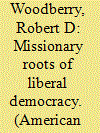

|
|
|
|
|
| Publication |
2012.
|
| Summary/Abstract |
This article demonstrates historically and statistically that conversionary Protestants (CPs) heavily influenced the rise and spread of stable democracy around the world. It argues that CPs were a crucial catalyst initiating the development and spread of religious liberty, mass education, mass printing, newspapers, voluntary organizations, and colonial reforms, thereby creating the conditions that made stable democracy more likely. Statistically, the historic prevalence of Protestant missionaries explains about half the variation in democracy in Africa, Asia, Latin America and Oceania and removes the impact of most variables that dominate current statistical research about democracy. The association between Protestant missions and democracy is consistent in different continents and subsamples, and it is robust to more than 50 controls and to instrumental variable analyses.
|
|
|
|
|
|
|
|
|
|
|
|
|
|
|
|
| 10 |
ID:
113560
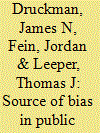

|
|
|
|
|
| Publication |
2012.
|
| Summary/Abstract |
A long acknowledged but seldom addressed problem with political communication experiments concerns the use of captive participants. Study participants rarely have the opportunity to choose information themselves, instead receiving whatever information the experimenter provides. We relax this assumption in the context of an over-time framing experiment focused on opinions about health care policy. Our results dramatically deviate from extant understandings of over-time communication effects. Allowing individuals to choose information themselves-a common situation on many political issues-leads to the preeminence of early frames and the rejection of later frames. Instead of opinion decay, we find dogmatic adherence to opinions formed in response to the first frame to which participants were exposed (i.e., staunch opinion stability). The effects match those that occur when early frames are repeated multiple times. The results suggest that opinion stability may often reflect biased information seeking. Moreover, the findings have implications for a range of topics including the micro-macro disconnect in studies of public opinion, political polarization, normative evaluations of public opinion, the role of inequality considerations in the debate about health care, and, perhaps most importantly, the design of experimental studies of public opinion.
|
|
|
|
|
|
|
|
|
|
|
|
|
|
|
|
| 11 |
ID:
113555


|
|
|
|
|
| Publication |
2012.
|
| Summary/Abstract |
How do domestic institutions affect autocratic leaders' decisions to initiate military conflicts? Contrary to the conventional wisdom, I argue that institutions in some kinds of dictatorships allow regime insiders to hold leaders accountable for their foreign policy decisions. However, the preferences and perceptions of these autocratic domestic audiences vary, with domestic audiences in civilian regimes being more skeptical of using military force than the military officers who form the core constituency in military juntas. In personalist regimes in which there is no effective domestic audience, no predictable mechanism exists for restraining or removing overly belligerent leaders, and leaders tend to be selected for personal characteristics that make them more likely to use military force. I combine these arguments to generate a series of hypotheses about the conflict behavior of autocracies and test the hypotheses using new measures of authoritarian regime type. The findings indicate that, despite the conventional focus on differences between democracies and nondemocracies, substantial variation in conflict initiation occurs among authoritarian regimes. Moreover, civilian regimes with powerful elite audiences are no more belligerent overall than democracies. The result is a deeper understanding of the conflict behavior of autocracies, with important implications for scholars as well as policy makers.
|
|
|
|
|
|
|
|
|
|
|
|
|
|
|
|
|
|
|
|
|